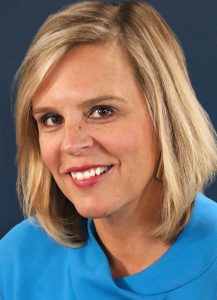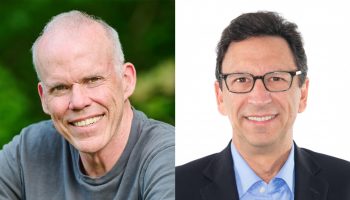Kimberly Churches doesn’t subscribe to the Golden Rule. Treating people the way you wish to be treated? That’s egotistical, she said — at best.

“That’s a very self-centered way of thinking because it’s focusing solely on our lived experiences, our upbringing, our own personal values,” Churches said.
So, “flip it on its head” and treat people how they wish to be treated. That acknowledgement, she said, is how “change will be made.”
Churches, CEO of the American Association of University Women, will deliver her lecture “Close the Gaps Forever” at 10:45 a.m. EDT Tuesday, July 28, on the CHQ Assembly Video Platform as part of the Week Five theme “The Women’s Vote Centennial And Beyond.”
In 2017, Churches attended the Women’s March in Washington D.C. with her daughter and sister. Though it was “a moving experience,” she said she feared there was a limit to its agenda.
“I felt like there was no set itinerary as to what could be done to break down the barriers and biases for women and girls,” she said. “Even the laws we have in this country don’t actually ensure that human behavior and practice is fully met in the end.”
She joined the American Association of University Women, an organization “committed to empowering women” through education and economic security, that same year. In 2018, she put forward a strategic plan that focuses on implementing plans to achieve more “racial and gender equities” throughout the nation, especially within the “realm of equal access to education.”
To give a perspective on how “we got here,” Churches said she will take a step back in history during her lecture, starting with the Equal Pay Act of 1963, which “aimed and failed’ to abolish the gender wage disparity.
“The gap has barely budged in the last two decades, when we should have had equal pay for people of color and for women right when this law was initially passed,” she said. “It’s not happening in practice because there are loopholes and not enough transparency or accountability.”
Even laws that successfully prompt immediate action often miss a mark of their own, according to Churches. For example, the 19th Amendment did grant women the right to vote, but Churches said white women were the only ones to reap its benefits.
They want to see diversity and inclusion and accessibility in everything they do,” Churches said. “Research has shown for decades that if you have more people with different backgrounds around the table, better decisions are made. If you are homogenous in your thinking, the same ideas will keep getting regurgitated. That doesn’t make them good ideas.”
“That law only helped white women when it came down to it, not women of color,” Churches said. “The individual and collective work we all need to be doing is making sure we are examining our own biases and checking them at the door. Passing laws is important, but we need to ensure that we are improving human behavior and accountability at the same time or we are going nowhere.”
The overlap of the COVID-19 pandemic and Black Lives Matter movement presents a “beautiful opportunity” to break those historical cycles of “words being valued over actions,” Churches said.
“You have an American public that is not on European vacations or running to see the latest blockbuster movie,” she said. “We have more opportunities right now to listen, absorb and then act on what we hear.”
While permanently breaking those cycles may not be a feat accomplished in her lifetime, Churches said she is optimistic that younger generations — millennial and Gen Z — are already doing the necessary work to reform their workplaces beyond what is “written in the handbooks.”
“They want to see diversity and inclusion and accessibility in everything they do,” Churches said. “Research has shown for decades that if you have more people with different backgrounds around the table, better decisions are made. If you are homogenous in your thinking, the same ideas will keep getting regurgitated. That doesn’t make them good ideas.”
This program is made possible by the Margaret Miller Newman Lectureship Fund.




